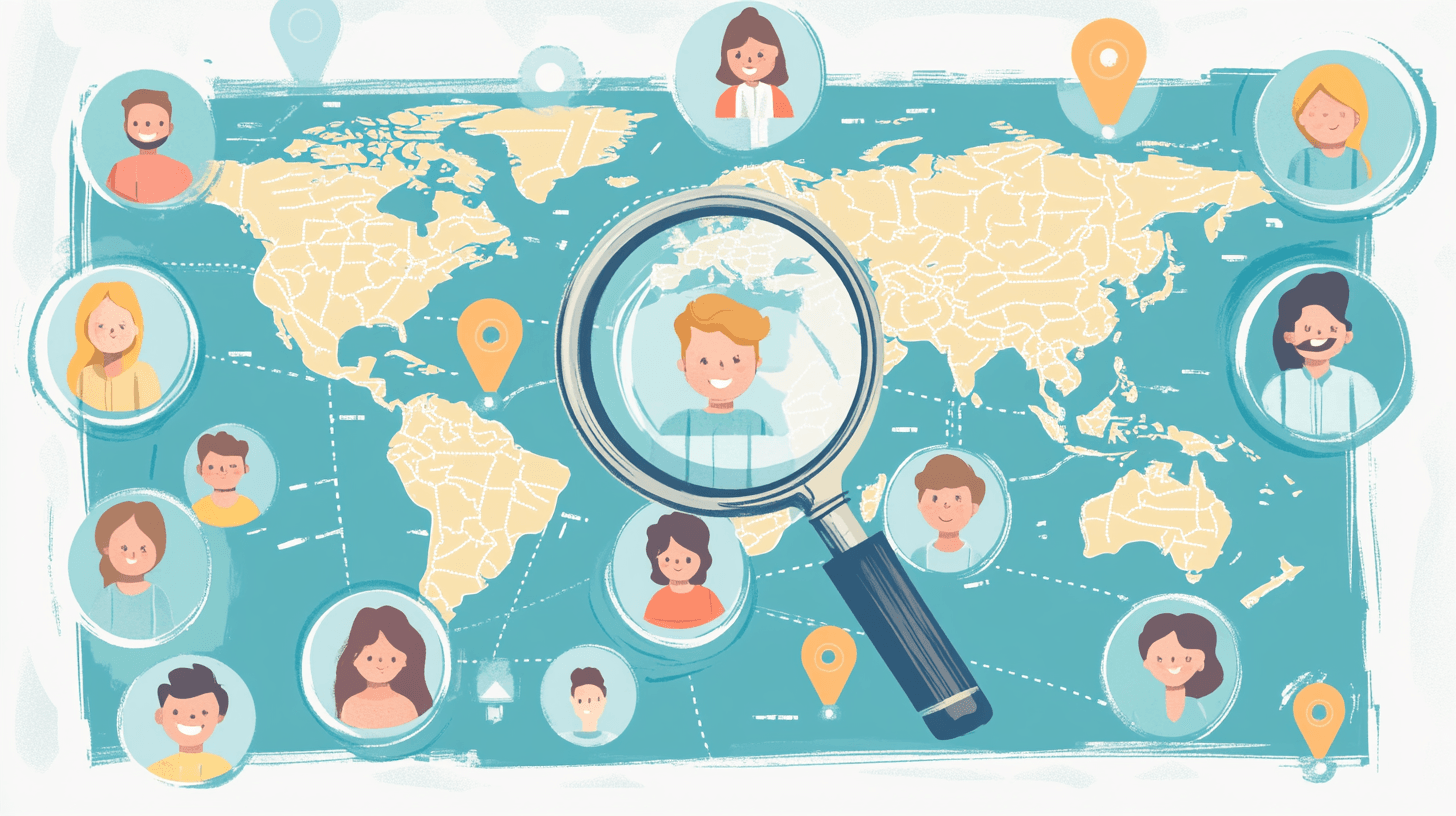Tips Không Giỏi Ngoại Ngữ Vẫn Tìm Kiếm Khách Hàng Tiềm Năng Quốc Tế Hiệu Quả

Một trong những trở ngại khiến doanh nghiệp Việt chùn bước chính là rào cản ngôn ngữ. Bạn có thể có sản phẩm tốt, giá cạnh tranh, thậm chí là định hướng thị trường rõ ràng — nhưng lại không biết phải gõ từ khóa gì để tìm đúng khách hàng quốc tế.
Vấn đề tưởng nhỏ, nhưng lại là “nút thắt” khiến nhiều doanh nghiệp bỏ lỡ cơ hội lớn.
Vậy, không biết tiếng nước ngoài thì có thể làm xuất khẩu được không? Câu trả lời là có, nếu bạn hiểu rõ vấn đề — và biết cách ứng dụng công nghệ để vượt qua nó.
1. Sai lầm phổ biến khi tìm kiếm khách hàng quốc tế bằng tiếng Việt
Hãy thử đặt mình vào vị trí một chủ doanh nghiệp Việt Nam muốn bán gỗ keo sang Trung Quốc. Bạn lên Google, gõ “công ty nhập khẩu gỗ Trung Quốc” hoặc “nhà nhập khẩu gỗ keo Trung Quốc”.
Kết quả bạn nhận được có thể là:
- Một vài tin tức cũ
- Các trang tiếng Việt từ báo chí hoặc diễn đàn
- Những danh sách tổng hợp mơ hồ, không có thông tin giao dịch thực
Vì sao lại vậy?
Bởi các công ty nhập khẩu gỗ ở Trung Quốc không dùng tiếng Việt để mô tả họ là ai hay họ đang cần gì. Họ có thể viết trên web hoặc trong báo cáo thương mại là “进口桉木” (nhập khẩu keo), hoặc “木材进口商” (nhà nhập khẩu gỗ).
Nếu bạn không biết tiếng Trung, không gõ đúng từ khóa bản địa, thì kết quả trả về sẽ luôn bị sai lệch hoặc thiếu sót nghiêm trọng.
Tương tự, nếu bạn muốn tiếp cận doanh nghiệp Nhật đang nhập khẩu cà phê, nhưng chỉ gõ “cà phê Nhật Bản” thì kết quả sẽ hầu như không giúp gì.
Đây là một sai lầm cực kỳ phổ biến trong xuất khẩu hiện nay — sử dụng từ khóa tiếng Việt để tìm kiếm thông tin nước ngoài và kỳ vọng rằng sẽ tìm thấy điều mình cần.
2. Hiểu về ngôn ngữ thương mại và dữ liệu bản địa
Trên thực tế, mỗi thị trường đều sử dụng ngôn ngữ riêng biệt trong kinh doanh. Không chỉ là ngôn ngữ nói, mà còn là ngôn ngữ tìm kiếm, ngôn ngữ hợp đồng, ngôn ngữ báo cáo thương mại.
Hãy xem một vài ví dụ:
Ý định tìm kiếm (tiếng Việt) | Từ khóa đúng (bản địa) | Ngôn ngữ |
|---|---|---|
Nhập khẩu tiêu Hàn Quốc | 후추 수입업체 | Hàn Quốc |
Nhà nhập khẩu chà là UAE | موردي التمر الإمارات | Ả Rập |
Xuất khẩu hạt điều sang Nhật | カシューナッツ 輸入会社 | Nhật Bản |
Bán gạo sang Trung Quốc | 大米 进口商 | Trung Quốc |
Bạn có thể nói: “Tôi có thể dùng Google Translate!”. Nhưng thực tế không đơn giản vậy.
Google Translate dịch theo văn nói, không hiểu ngữ cảnh thương mại. Khi bạn dùng công cụ đó để dịch “gạo xuất khẩu”, rất có thể bạn sẽ nhận được một cụm từ không phổ biến trong dữ liệu doanh nghiệp — dẫn đến kết quả tìm kiếm sai lệch.
Tệ hơn, từ khóa sai còn khiến bạn tìm nhầm khách hàng — ví dụ: bạn muốn tìm “nhà nhập khẩu” nhưng lại gõ từ mô tả “người tiêu dùng”, hoặc kết quả chỉ ra các công ty bán lẻ.
3. EximGPT giải quyết rào cản ngôn ngữ như thế nào?
3.1. Hiểu tiếng Việt – Tìm kiếm đúng bằng từ khóa bản địa, trả kết quả tiếng Anh dễ hiểu
EximGPT là một công cụ AI được thiết kế riêng cho ngành xuất nhập khẩu B2B, tích hợp dữ liệu thương mại toàn cầu với khả năng hiểu ngôn ngữ bản địa.
Bạn chỉ cần gõ bằng tiếng Việt như:
“nhà nhập khẩu hồ tiêu ở UAE”
“xuất khẩu thanh long sang Nhật”
“mua hải sản đông lạnh tại Hàn Quốc”

Hệ thống sẽ tự động chuyển đổi từ khóa tiếng Việt sang đúng cụm từ thương mại bản địa để tìm kiếm, sau đó trả kết quả bằng tiếng Anh đã chuẩn hóa, giúp bạn dễ dàng hiểu và phân tích.

Hệ thống còn truy vấn trên dữ liệu giao dịch thực tế — nghĩa là các kết quả trả về đều là công ty đã từng có hoạt động nhập khẩu mặt hàng bạn quan tâm, không phải danh sách chung chung.

3.2. Gợi ý nội dung email phù hợp văn hóa và ngôn ngữ

Sau khi tìm được khách hàng tiềm năng, bạn sẽ cần tiếp cận họ — thường bằng email. Nhưng viết email thương mại bằng tiếng Nhật, Hàn hay Ả Rập là điều không dễ.
EximGPT có thể tự động gợi ý nội dung email chào hàng với:
- Ngôn ngữ chính xác
- Tông giọng phù hợp với văn hóa kinh doanh bản địa
- Tránh những cụm từ dễ gây phản cảm (ví dụ “cheap” trong tiếng Nhật nên thay bằng “reasonable price”)
Nhờ vậy, bạn không cần biết tiếng — vẫn có thể gửi email đúng chuẩn, đúng văn hóa, làm tăng khả năng được phản hồi.
Rào cản ngôn ngữ từng là điều khiến nhiều doanh nghiệp vừa và nhỏ ngại tiếp cận thị trường quốc tế. Nhưng với EximGPT, bạn hoàn toàn có thể vượt qua giới hạn này — không cần biết tiếng, không cần thuê dịch vụ tốn kém, vẫn tìm đúng khách hàng và tiếp cận hiệu quả.
Công nghệ bản địa hóa chính là chìa khóa giúp doanh nghiệp Việt Nam tự tin bước ra thế giới. Bạn có thể dùng thử bản Trial của EximGPT tại: https://www.eximgpt.com/exim-lead